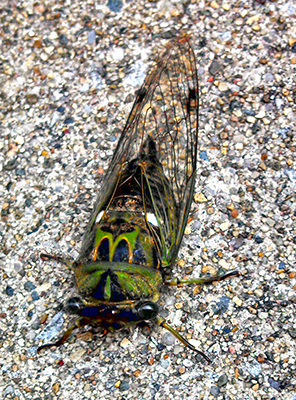 Purdue University - Extension - Forestry and Natural Resources
Purdue University - Extension - Forestry and Natural Resources
Got Nature? Blog
The cicadas are back. After Brood XXIII of the 13-year periodic cicadas emerged for a couple weeks this June, we had around a month of relative quiet as crickets, frogs, and other nighttime wildlife provided us with typical sounds of the summer.

Photo credit: Aaron Doenges
Now, as the annual cicadas emerge with calls as loud as 100 decibels, the outdoors is noisy with insect calls once again. Annual cicadas are also known as dog-day cicadas due to their arrival coinciding with Sirius, the dog star, being visible at sunrise. They are green and black in color, in contrast to orange and black periodic cicadas. These insects spend 2-4 years in the ground feeding on sap from tree roots, but due to staggering emergence schedules, some of them come out every late summer.
An interesting fact about dog-day cicadas is that they are one of folklore legend’s predictors of weather. There are several age-old observations that have been used to estimate weather over the years. For example, oak leaves reaching the size of a squirrel’s ear is known to be the perfect time to plant corn. A common one you are surely familiar with is Groundhog’s Day, February 2nd, when the sighting of clouds when a groundhog emerges from its hole predicts spring weather coming six weeks before it would be if the weather was sunny. Consider dog-day cicadas the anti-groundhog. The passed-down warning is that after the first call of the dog-day cicadas, there will be six weeks till frost. So enjoy the weather while you can! The cicadas are out, and if they are to be believed, cold weather is on the way.
To read more, check out Professor of Entomology Tom Turpin‘s On Six Legs column “Cicada Weather Predictors“.
Resources
Cicada Weather Predictors – On Six Legs, Purdue Extension
Large Brood of Periodical Cicadas Return After Thirteen Years – Got Nature?
On Six Legs Archive – Purdue Extension
Annual Cicadas (Dog-Day Cicadas) – Missouri Department of Conservation
Does the Song of Dog-Day Cicadas Predict the First Frost? – About Education
Tom Turpin, Professor of Entomology
Purdue University

Recent Posts
- Report Spotted Lanternfly – Purdue Landscape Report
Posted: April 10, 2024 in Alert, Forestry, Invasive Insects, Plants, Wildlife, Woodlands - Declining Pines of the White Variety – Purdue Landscape Report
Posted: in Alert, Disease, Forestry, Plants, Wildlife, Woodlands - Are you seeing nests of our state endangered swan? – Wild Bulletin
Posted: April 9, 2024 in Alert, Forestry, How To, Wildlife - Cicadas in Spring! – Purdue Landscape Report
Posted: in Forestry, Plants, Safety, Wildlife - New Deer Impact Toolbox
Posted: April 7, 2024 in Forestry, Land Use, Plants, Publication, Safety, Wildlife, Woodlands - 2024-25 Fishing Guide now available – Wild Bulletin
Posted: April 4, 2024 in Alert, Aquaculture/Fish, Aquatic/Aquaculture Resources, How To, Ponds, Wildlife - Help Research Chronic Wasting Disease – Wild Bulletin
Posted: April 3, 2024 in Disease, Forestry, How To, Safety, Wildlife, Woodlands - Indiana Reptiles and Amphibians – IFWOA Webinar
Posted: April 1, 2024 in Forestry, How To, Webinar, Wildlife, Woodlands - Birding through the Seasons – IFWOA Webinar
Posted: in Forestry, How To, Webinar, Wildlife, Woodlands - Look Out for Invasive Carp in Your Bait Bucket – Wild Bulletin
Posted: March 31, 2024 in Alert, Aquaculture/Fish, Aquatic/Aquaculture Resources, Invasive Animal Species, Wildlife
Archives
Categories
- Alert
- Aquaculture/Fish
- Aquatic/Aquaculture Resources
- Ask the Expert
- Christmas Trees
- Community Development
- Disease
- Drought
- Forestry
- Forests and Street Trees
- Gardening
- Got Nature for Kids
- Great Lakes
- How To
- Invasive Animal Species
- Invasive Insects
- Invasive Plant Species
- Land Use
- Natural Resource Planning
- Nature of Teaching
- Plants
- Podcasts
- Ponds
- Publication
- Safety
- Timber Marketing
- Uncategorized
- Urban Forestry
- Webinar
- Wildlife
- Wood Products/Manufacturing
- Woodland Management Moment
- Woodlands